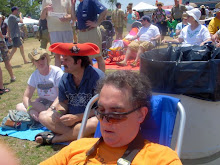Jury Told it "Must" Convict: 2nd Cir. Gets it Wrong
An interesting post from the Second Circuit Blog on the case of United States v. Carr. Seems the Second Circuit - one of the least jury friendly of the Federal appellate courts - recently held that a district court can properly tell a jury that it has a "duty to convict" if the government proves the guilt of the defendant beyond reasonable doubt.
This isn't news, but it is wrong. A jury cannot be required to convict in any circumstances, although they can be ordered to acquit if the judge finds the evidence insufficient to sustain a conviction. This is pretty well black letter law.
What the Second Circuit seems to ignore is the history behind trial by jury. But this isn't, again, surprising. It's the same approach they took in United States v. Thomas, in which it determined that a juror who decides not to convict on conscientious grounds is committing misconduct. Such a juror is exercising a prerogative which is protected by law; yet only if he exercises it before the judge figures out what he is doing. The decision in Thomas was based on sheer fiat: "nullification is jury misconduct because we (backed by an army of bureaucrats) say it is." Yet the history is clear that a juror cannot be punished because he or she nullified, and that a nullification acquittal if final. Thomas is not only fiat law; it is paradoxical and inconsistent.
My problem with the decision in Carr is simply that it is dishonest, and I think that judges should at the very least be truthful with jurors if they are to expect the legal system to be viewed with any respect. It simply is not true that a juror has a "duty to convict" in any case, under any facts. While judges may wish to remain silent as to the fact that a jury has a prerogative to acquit whatever the facts, they should not misinform the jury as to the opposite of the truth.
Historically, courts would inform jurors that they MUST acquit if they had a reasonable doubt, but that they SHOULD convict if the case was proven beyond a reasonable doubt. This distinction was adequate to preserve the jury's historic prerogative without unduly emphasizing it. This is the approach that the D.C. Circuit Court of Appeals took in United States v. Dougherty, 473 F.2d 1113 (D.C. Cir. 1972), a leading case on the topic of jury nullification. Whatever shortcomings this approach may have to those who wish the jury to have more, rather than less, information concerning their prerogative to judge the merits of the law, it at least remains free of the fatal vice of having trial court judges affirmatively lie to jurors - as the Second Circuit has permitted in Carr.


0 Comments:
Post a Comment
<< Home